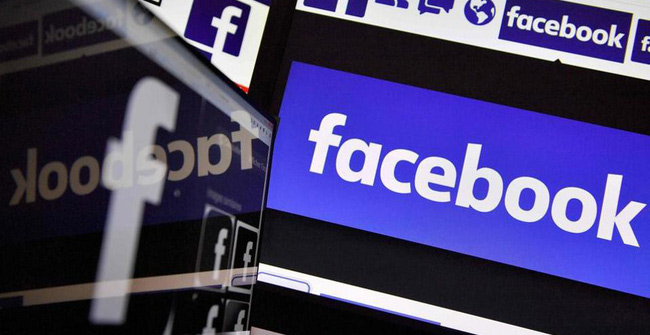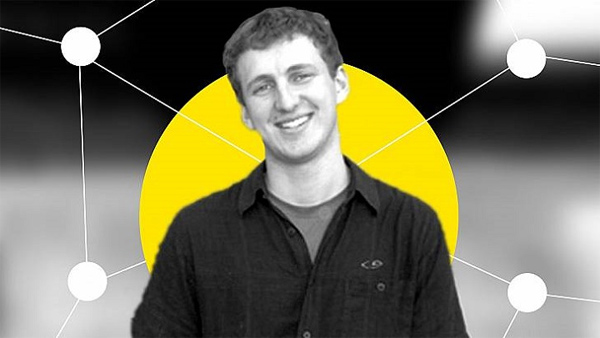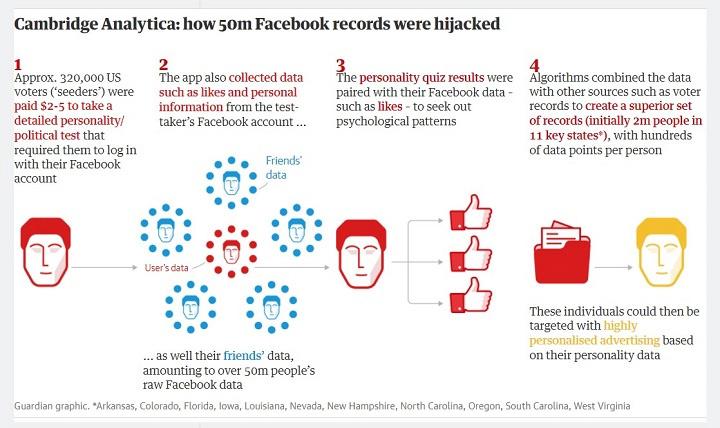How have 50 million Facebook users been taken advantage of by Cambridge Analytica to serve politics?
In the data leak of more than 50 million Facebook accounts, the algorithm used has scooped up almost all of the user's personal information, even sensitive information such as sexual orientation, intelligence. and psychological injuries from childhood through "like" buttons that Facebook users still use.
Five years ago, psychologists have shown that, from some invisible patterns for people scanning through individual pages, complex traits can be given. Only a few like buttons seem to be completely random but are the basis for shaping the inner personality.

No need to analyze every message, post, status update, image or other information, only a few dozen 'like' buttons are enough for this algorithm to predict all information of users like gender. gender, homosexual or heterosexual tendencies, vote for which party, family situation .
The ability to predict personal attributes from digital behavior records can easily be applied to a large number of users without them agreeing or even not recognizing them. This will be a huge business potential for commercial companies, government organizations .
In early 2014, CEO Alexander Nix of Cambridge Analytica signed a contract with Aleksandr Kogan, Cambridge lecturer on a private commercial project.
Kogan's job is to create an application that includes questions about personal information. Respondents will be paid by Cambridge Analytica (there are already about 27,000 participants) and they will promote the app on multiple platforms, such as Amazon's Mechanical Turk. Participants are asked to allow them to access some information such as their names, geographic locations, gender, "like" pages and their friends list.

Aleksandr Kogan, the creator of the application, has "scourged" Facebook.
The results of each question are recorded by the application, it even collects data of the Facebook account of the executor, and extracts the data of the friends of that account. After that, the results will be compared with the Facebook data of the respondents to find a common point. Based on the results obtained will build algorithms to predict the results of other Facebook users. This algorithm will use individual pages to test the formula and collect data to make it politically valuable.
To be able to participate in a reply, users must be US citizens who are eligible to vote and have a Facebook account. So with tens of millions of personal pages will certainly have a huge impact on the election. From just 1,000 "seed" accounts, the researchers have collected more than 160,000 records, and the number keeps increasing exponentially.

In theory, Kogan is only allowed to collect and use data for research purposes, not commercially. That is, Kogan's action is a violation of Facebook's rules. Selling such data or using them for other purposes is absolutely granted.
In addition, according to UK data protection laws, prohibiting the sale and use of personal data without the permission of their owners including cases when agreeing to a purpose but evil Whether it was used for other purposes, Kogan's actions were illegal.
Although the participating accounts agreed with the terms of Kogan's application, none of them knew and agreed with their abusive data to create a political marketing tool. , often placed in the database of campaign campaigns.
But Kogan insisted that he did not make a mistake. Facebook had no idea when he changed the purpose of the application from "research" to "commercial".
Facebook also claims this is not an information leak, but a case of using their rules.
In just a few months, Kogan and Cambridge Analytica gathered a huge database of tens of millions of American voters. Using the algorithms they developed to analyze political personalities and views choose certain goals and create compelling messages for them - a political approach called "micro-targetting" ".
Three years ago, Facebook was said to be aware of the incident, but it did not publish it to users and authorities, but only made changes to prevent it from recurring in the future. This has angered users and called for a "boycott" of the world's largest social network.
See more:
- This cool young man is the one who exposed the data leak of 50 million Facebook users
- Things to do before deleting your Facebook account
- How to change the black text BFF to blue to create special effects on Facebook
- How to turn off Facebook Platform to stop sharing personal data
You should read it
- ★ Zuckerberg sent a message to Facebook users in the scandal of data disclosure
- ★ Cambridge Analytica asks for bankruptcy after the scandal with Facebook
- ★ After the scandal revealed data of 50 million accounts, social network users called to delete Facebook accounts
- ★ Infringement of privacy, Facebook faces a million-dollar fine
- ★ What does leak mean?